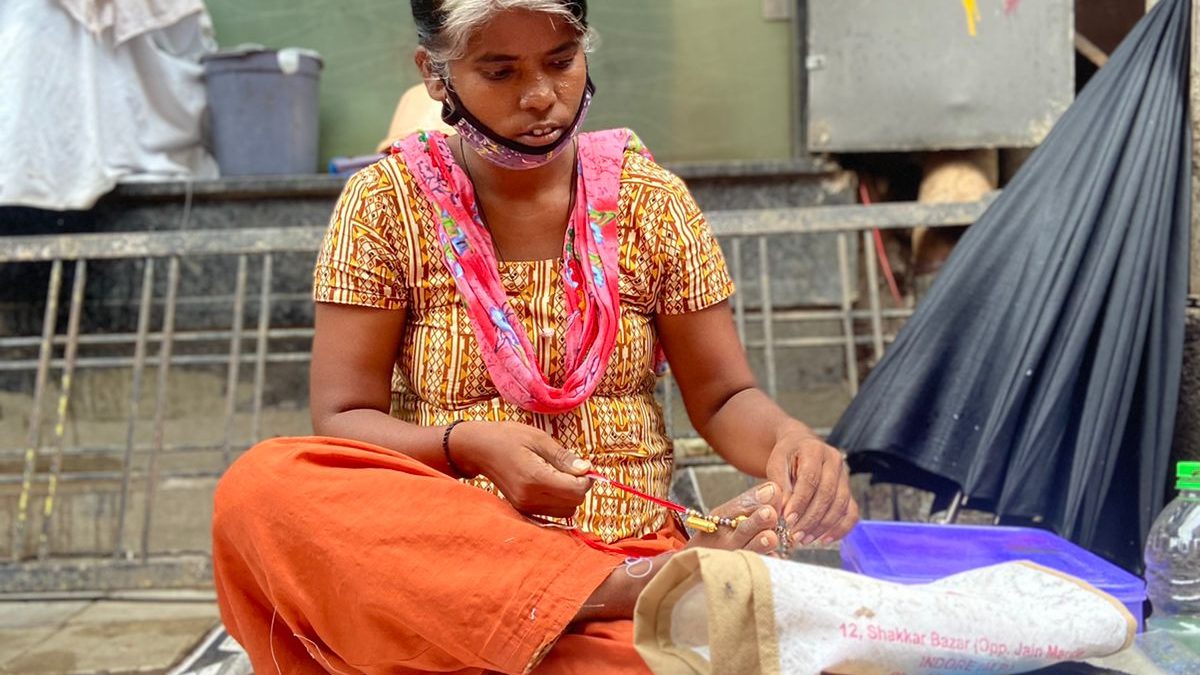India is a country of artisans. Indians are known for having incredible talent in designing and creating beautiful artifacts. You can find these artisans even as you go street shopping or at flee markets anywhere in India. One such person that you will find in Indore, is Rekha Gaud.
Making artificial gold and silver bead jewellery, she has been working for the last 20 years. From necklaces, to anklets and bracelets, Rekha makes a lot of such beautiful jewellery pieces. She learned this art of hand weaving from her mother. Along with her hands, she uses her feet, to hook on the threads on her toes, while she beads the necklaces. She says that she also uses all her senses, like her eyes, ears and touch.
Selling her handmade necklaces for ₹50 each, she earns up to ₹400 to ₹500 every day. Every morning, she wakes up, goes to her designated spot on a street, and on a mat spread, she sits and makes sale of her beautifully crafted jewellery.
Like a lot of daily wage workers, she also had to suffer when covid came around India in March of last year. All of these people were out of jobs and had to face a myriad of problems with the sole reason of not being able to earn their daily wage. But during these trying times, the government stepped up and helped all of these workers. The government helped all the street vendors and hawkers, by providing them with loans. They also gave all of these vendors and hawkers free ration as well.
With the help of all of this, Rekha was able to go back to selling her beautiful jewellery. Before her, Rekha’s mother worked the same spot for over 35 years, for a family of seven. Their responsibility passed on Rekha, who takes care of them now.
The pandemic has had the greatest impact on street selling activities, which contributes significantly to India’s urban economy, leaving serious long-term effects on their livelihoods. The impact has been especially severe in this sector since the nature of the employment necessitates extensive movement and access to consumers, commodities, and markets.
In circumstances like these, most sellers, who are mostly daily workers, have no other choice. As a result, when the government declared a pandemic-induced lockdown in March 2020 with a four-hour warning, these migrant daily income street sellers had no choice but to return to their original communities, leading to one of the country’s worst migrant labour crises.
The Pradhan Mantri Street Sellers AtmaNirbhar Nidhi (PM SVANidhi) initiative was launched by the Ministry of Housing and Urban Affairs (MoHUA) in June 2020 to assist street vendors in recovering their livelihoods.
The initiative’s concept is to give readily repayable loans of up to Rs. 10,000, with the government expecting to help over 50 lakh street sellers in India.
According to official figures released this month, almost 30 lakh applications had been submitted, with the Centre approving slightly more than half of them. As of November 2020, more than 7.5 lakh loans had been issued.
In this case, there are questions regarding whether the scheme’s benefits would reach the intended recipients. There should be a mechanism that permits suppliers who have not yet registered to take use of the scheme’s benefits, subject to verification and background checks. While carrying out the socioeconomic profiling programme, the government must keep these issues in mind so that the scheme’s intended goal is realised to the maximum extent possible.


